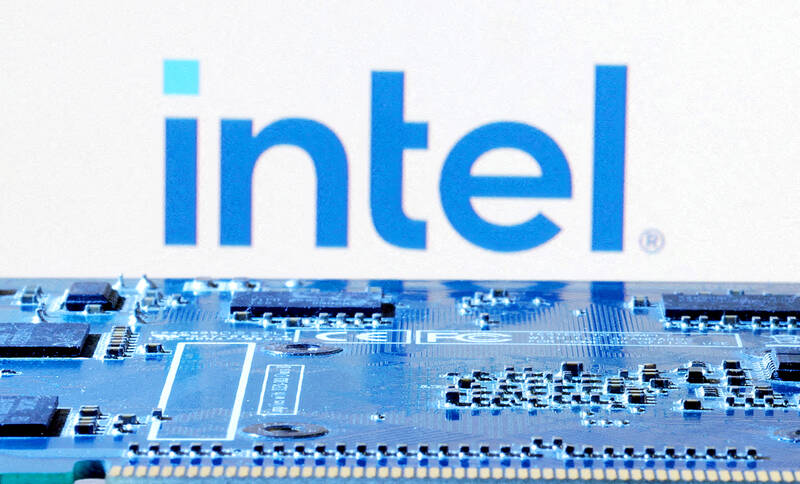A Chinese cybersecurity association yesterday recommended a review of products that semiconductor giant Intel Corp sells in the country, accusing it of threatening national interests.
For decades, California-based Intel has dominated the market for the chips that run everything from laptops to data centers, with China among the company’s biggest markets.
The statement by the Cybersecurity Association of China (CSAC) — an industry group with close links to the Chinese government — said some processing units made by Intel were deemed to have “frequent” security flaws.

Photo: Reuters
This has exposed users to potential attacks that could see sensitive personal data, including passwords and bank card numbers, stolen, the statement said.
“Intel has made a lot of money in China, but the company has continuously done things that harm China’s interests and threaten China’s national security,” CSAC said in the statement.
“It is recommended to initiate a cybersecurity review of Intel’s products sold in China to effectively safeguard China’s national security and the lawful rights and interests of Chinese consumers,” it added.
The statement also said Intel was working to “suppress China” by requiring its suppliers to avoid using labor or products from the Xinjiang region, where Beijing is accused of widespread rights violations.
The US Uyghur Forced Labor Prevention Act bans the import of all goods from the Xinjiang region unless companies offer verifiable proof that production did not involve such a violation.
Beijing and Washington have been locked in a tit-for-tat tech battle, vying for supremacy in fields including advanced semiconductors and artificial intelligence.
Last year, Beijing launched an investigation into US memory chipmaker Micron Technology Inc, citing the need to “safeguard national security.”
Separately, Qualcomm Inc is likely to wait until after the US presidential election next month before deciding whether to pursue an offer to buy Intel, people familiar with the matter said.
San Diego-based Qualcomm wants greater clarity on the new occupant of the White House before deciding its next move because of the impact any future administration would have on the antitrust landscape and America’s relationship with China, according to the people, who asked not to be identified discussing confidential information.
Qualcomm could opt to wait until after the inauguration of the new US president in January before deciding how to proceed, given the many complexities of a potential transaction involving Intel, some of the people said.
A combination of Qualcomm and Intel, whose products are key to the digital framework supporting everyday life — from smartphones to electric vehicles — would almost certainly draw intense scrutiny from antitrust regulators in the US and around the world. That includes China, a key market for both Qualcomm and Intel.
Qualcomm made a preliminary approach to Intel on a possible takeover of its struggling rival in September last year. In the same month, the company made informal inquiries with antitrust regulators in China to gauge their stance on any potential deal, some of the people said. Qualcomm hasn’t received any feedback from Chinese authorities, which are waiting to see if the company actually makes a formal bid, they said.
Additional reporting by Bloomberg

The US dollar was trading at NT$29.7 at 10am today on the Taipei Foreign Exchange, as the New Taiwan dollar gained NT$1.364 from the previous close last week. The NT dollar continued to rise today, after surging 3.07 percent on Friday. After opening at NT$30.91, the NT dollar gained more than NT$1 in just 15 minutes, briefly passing the NT$30 mark. Before the US Department of the Treasury's semi-annual currency report came out, expectations that the NT dollar would keep rising were already building. The NT dollar on Friday closed at NT$31.064, up by NT$0.953 — a 3.07 percent single-day gain. Today,

‘SHORT TERM’: The local currency would likely remain strong in the near term, driven by anticipated US trade pressure, capital inflows and expectations of a US Fed rate cut The US dollar is expected to fall below NT$30 in the near term, as traders anticipate increased pressure from Washington for Taiwan to allow the New Taiwan dollar to appreciate, Cathay United Bank (國泰世華銀行) chief economist Lin Chi-chao (林啟超) said. Following a sharp drop in the greenback against the NT dollar on Friday, Lin told the Central News Agency that the local currency is likely to remain strong in the short term, driven in part by market psychology surrounding anticipated US policy pressure. On Friday, the US dollar fell NT$0.953, or 3.07 percent, closing at NT$31.064 — its lowest level since Jan.

The New Taiwan dollar and Taiwanese stocks surged on signs that trade tensions between the world’s top two economies might start easing and as US tech earnings boosted the outlook of the nation’s semiconductor exports. The NT dollar strengthened as much as 3.8 percent versus the US dollar to 30.815, the biggest intraday gain since January 2011, closing at NT$31.064. The benchmark TAIEX jumped 2.73 percent to outperform the region’s equity gauges. Outlook for global trade improved after China said it is assessing possible trade talks with the US, providing a boost for the nation’s currency and shares. As the NT dollar

The Financial Supervisory Commission (FSC) yesterday met with some of the nation’s largest insurance companies as a skyrocketing New Taiwan dollar piles pressure on their hundreds of billions of dollars in US bond investments. The commission has asked some life insurance firms, among the biggest Asian holders of US debt, to discuss how the rapidly strengthening NT dollar has impacted their operations, people familiar with the matter said. The meeting took place as the NT dollar jumped as much as 5 percent yesterday, its biggest intraday gain in more than three decades. The local currency surged as exporters rushed to